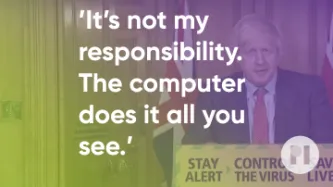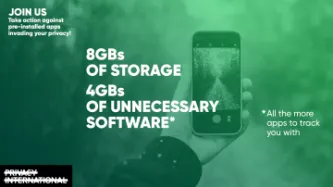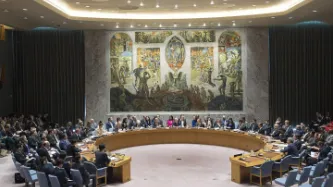Advanced Search
Content Type: News & Analysis
Uganda's Presidential election in January 2021 resulted in the incumbent President Museveni winning his sixth term in office, having held power for 35 years. The election took place amidst a global pandemic and the run up to election day was fraught. Violence left dozens dead and hundreds more arrested, including the opposition candidate Bobi Wine. Mass rallies and in person campaign meetings were banned due to Covid restrictions and political parties in Uganda were encouraged to conduct “…
Content Type: Long Read
In May 2019, the UK Department for Work and Pensions (DWP) – the department in charge of welfare – published their two-part staff guide on conducting fraud investigations. Privacy International went through the 995 pages to understand how those investigations happen and how the DWP is surveilling benefits claimants suspected of fraud.
Anyone who has flipped through a tabloid will have seen articles exposing the so-called “benefits-cheats,” people who allegedly trick the benefits systems for…
Content Type: Long Read
Back in 2019, we read through a 1000-page manual released by the UK Department for Work and Pensions (DWP) describing how they conduct investigations into alleged benefits fraud. While out in the open and accessible to anyone, the guide turned out to be a dizzying dive into a world where civil servants are asked to stand outside someone’s door to decide if they are indeed single or disabled and have to be reminded that living together as a married couple is not an offense. The guide – which…
Content Type: News & Analysis
Earlier this week, the UK Government announced that no immigration status checks will be carried out for migrants trying to register with their GP and get vaccinated. But temporary offers of safety are not enough to undo the decades of harm caused by policies that have embedded immigration controls into public services.
Years of charging migrants for healthcare and sharing patient data with the Home Office has eroded trust between migrant communities and the NHS. As a result, they might not…
Content Type: Advocacy
This letter is also available in Spanish.
Dear Mr. Zuckerberg and Mr. Pichai,
In the past few years, you have pioneered important transparency tools to help your platform users understand, learn about and contextualise the political advertising they see. We agree that advertiser verification processes and ad repositories are key safeguards against online manipulation and misinformation. However, we are saddened to observe that these benefits have not been equally distributed among your global…
Content Type: Long Read
Among the many challenges of 2020, the impact on elections around the world kept us all on the edge of our seats. 75 countries postponed national and local elections due to Covid 19. Of the elections that went ahead, we saw Covid safe measures at polling stations (South Korea led the way forward in April) an increase in postal voting (who can forget the USA, but also Poland) and political parties in Uganda conducting "virtual" campaigns as mass rallies and in person campaign meetings were…
Content Type: Long Read
Political parties depend on data to drive their campaigns, from deciding where to hold rallies, which campaign messages to focus on in which area, and how to target supporters, undecided voters and non-supporters, including with ads on social media. Political parties increasingly hire private companies to do the bulk of this work, and our primary concern is how these companies use personal data to “profile” people and drive election campaigning.
As part of PI’s programme of work on Defending…
Content Type: Report
This paper examines the various legal frameworks governing micro-targeting in political campaigns in six states: Canada, Brazil, France, Italy, Spain and the UK. It aims to assess national practices as well as point out gaps in their respective frameworks. The paper commences by examining how micro-targeting is defined and thereafter examines the legal provisions applicable to micro-targeting activities.
To do this in an accessible way, the paper follows and analyses the series of activities…
Content Type: Long Read
As we see Covid-19 vaccination programmes beginning around the world, for the first time since the start of the pandemic there seems to be a light at the end of the tunnel as the fruition of truly unrivalled global scientific efforts has given us hope of saving lives, reopening our societies, and going back to “normal”.
This great moment of hope must not be seen opportunistically as yet another data grab. The deployment of vaccines, and in particular any “immunity passport” or certificate…
Content Type: Advocacy
Section 187 of the Data Protection Act read with Article 80 of the GDPR gives individuals the option to seek assistance from public interest non-profit organisations to take action against data controllers which have infringed their data rights. In this role, non-profit organisations may:
make complaints to the regulator on the individual’s behalf;
represent the individual in the courts when seeking a resolution of those complaints; and
bring legal claims against organisations they believe…
Content Type: News & Analysis
An excerpt of this piece was first published in June 2020 in Adbusters, an international not-for-profit magazine produced by a global collective of artists and activists who want to 'shake up complacent consumer culture'.
Big oil. Big tobacco. Big pharma. How did we let ‘big tech’ happen? You would have thought humanity would learn its lesson. That nothing good comes of the mass accumulation and concentration of power into the hands of so few.
The internet was meant to be different. No…
Content Type: Advocacy
International data transfers are an important feature of the present-day global economy. However, when crossing borders, data should also be accompanied by strong and effective privacy and personal data protections. Laws, such as the General Data Protection Regulation (GDPR), play an important role in ensuring data flows respect with privacy.
Trade negotiations that cover cross-border data flows can complicate this. All 80 countries that are part of digital trade negotiations should be able to…
Content Type: News & Analysis
Le « Fonds fiduciaire d’urgence de l’Union européenne en faveur de la stabilité et de la lutte contre les causes profondes de la migration irrégulière et du phénomène des personnes déplacées en Afrique » (le « fonds fiduciaire pour l’Afrique ») ne fait pas les grands titres (et il est plutôt difficile à retenir), mais son influence est vaste et aura des conséquences pendant plusieurs décennies sur la vie de millions de personnes sur le continent africain.
Mis en place suite à la « crise…
Content Type: News & Analysis
The “EU Trust Fund for Stability and Addressing Root Causes of Irregular Migration and Displaced Persons in Africa” (EUTF for Africa) isn’t exactly headline news (and nor does it exactly roll off the tongue), but its influence is vast and will be felt for decades to come for millions of people across Africa.
Set up in the wake of the 2015 ‘migration crisis’ in Europe and largely made up of money earmarked for development aid (80% of its budget comes from development and humanitarian aid funds…
Content Type: News & Analysis
PI is collaborating with The Carter Center election observation mission in the run up to and after Myanmar's national election on November 8th. The Carter Center is a US based NGO that has been invited to observe 111 elections in 39 countries since 1989. It has maintained a presence in Myanmar since 2013 when it's office was established in Yangon, and carried out long term observation for the 2015 election as well as 2020. The international election observer mission (IEOM) assesses the…
Content Type: Video
The two-minute video splices together clips of UK Prime Minister Boris Johnson, cleverly editing his speeches so that he mouths sentences such as:
'Coronavirus won’t affect you if your immunity passport’s blue'
'You can tell our technology’s going well, we’re running this whole thing in Excel'
'A mutant algorithm trick, when it goes wrong, the blame won’t stick'
'Our system’s world-beating at self-defeating'
'So when results are not forthcoming, don’t ask me, ask Dominic…
Content Type: Press release
The new satirical video is a critique of the government's reliance on 'technological solutionism' in the fight against Coronavirus and increasingly across public services more widely, and their willingness to then scapegoat ‘mutant algorithms’ when their hopes for technological panaceas inevitably fail.
The two-minute video splices together clips of Prime Minister Boris Johnson, cleverly editing his speeches so that he mouths sentences such as:
'Coronavirus won’t affect you if your immunity…
Content Type: Long Read
An edited version of this article was originally published on the EDRi website in September 2020.
Introduction
Monopolies, mergers and acquisitions, anti-trust laws. These may seem like tangential or irrelevant issues for privacy and digital rights organisations. But having run our first public petition opposing a big tech merger, we wanted to set out why we think this is an important frontier for people's rights across Europe and indeed across the world.
In June, Google notified the…
Content Type: Report
A common theme of all major pieces of national jurisprudence analyzing the rights implications of national identity system is an analysis of the systems’ impacts on the right to privacy.
The use of any data by the State including the implementation of an ID system must be done against this backdrop with respect for all fundamental human rights. The collection of data to be used in the system and the storage of data can each independently implicate privacy rights and involve overlapping and…
Content Type: News & Analysis
The Law Enforcement Data Service (LEDS) is a unified, common interface to a new mega-database currently being developed by the Home Office National Law Enforcement Data Programme (NLEDP). We believe that the development of the programme poses a threat to privacy and other rights and must be subjected to strong oversight, safeguards, and transparency measures.
As we explained in our analysis, the data in LEDS is vast, ever-increasing, worryingly mixes both evidential and intelligence material –…
Content Type: News & Analysis
Back in January, Privacy International and over 50 other organisations wrote to Google asking the company to take action over pre-installed apps that cannot be deleted (often known as “bloatware”), which can leave users vulnerable to their data being collected, shared and exposed without their knowledge or consent. Thousands of people from over 50 countries signed our petition supporting this ask. We welcome the constructive conversations we had with Google following this campaign and for the…
Content Type: News & Analysis
In the last few weeks, the UK government has announced various new measures to ensure that crossings across the Channel were “inviable” including by appointing a new role of “clandestine Channel threat commander" and further plans to deploy the navy to stop migrants from crossing to the UK from France across the Channel. Premature plans it seems, as not only would such measures be contrary to the UK’s international obligations to allow individuals to seek asylum in the UK, but also since such…
Content Type: Case Study
Privacy matters. It matters when you’re walking the streets of your home town and when you’re fleeing your home in search of safety. It matters if you’re at a protest or if you’re in bed.
Our wellbeing in each of these instances depends on the protection of our privacy. No situation can be fully understood in isolation.
Unjustifiable intrusions on our privacy become a weapon to eradicate communities and prey upon refugees and asylum seekers, push people away from protests in fear of…
Content Type: News & Analysis
Banning TikTok? It's time to fix the out-of-control data exploitation industry - not a symptom of it
Chinese apps and tech companies have been at the forefront of the news recently. Following India's ban of 59 chinese apps in July, President Trump announced his desire to ban TikTok, shortly followed by his backing of Microsoft's intention to buy the US branch of its parent company ByteDance. Other than others lip syncing his public declaration, what does President Trump fear from this app, run by a firm, based in China?
It's all about that data
One clear answer emerges: the exploitation of…
Content Type: News & Analysis
New technologies continue to present great risks and opportunities for any users but for some communities the implications and harms can have severe consequences and one of the sectors facing increasing challenges to keep innovating whilst protecting themselves and the people they serve is the humanitarian sector.
Over the course of engagement with the humanitarian sector, one of our key observations has been how risk assessments undertaken in the sector omitted to integrate a hollistic…
Content Type: News & Analysis
The UN Special Rapporteur on the promotion and protection of human rights and fundamental freedoms while countering terrorism, Professor Fionnuala Ní Aoláin together with Dr. Krisztina Huszti-Orbán, released today a key report on the “Use of Biometric Data to Identify Terrorists: Best Practice or Risky Business?”.
The report explores the human rights risks involved in the deployment of biometrics emphasising that
in the absence of robust rights protections which are institutionally embedded…
Content Type: Advocacy
Identification systems across the world increasingly rely on biometric data. In the context of border management, security and law enforcement, biometric data can play an important role in supporting the investigation and prevention of acts of terrorism.
This Briefing aims to map out some of the implications of the adoption of identification systems based on biometrics.
Content Type: Advocacy
Privacy International responded to the call for submissions on Zimbabwe’s Cyber Security and Data Protection Bill, 2019.
According to its Memorandum, the Bill seeks to “consolidate cyber related offences and provide for data protection with due regard to the Declaration of Rights under the Constitution and the public and national interest.” The Bill also proposes the establishment of a Cyber Security Centre and a Data Protection Authority.
In its submission, PI applauds the positive aspects…
Content Type: News & Analysis
In September 2019, PI published the report Your Mental Health for Sale. Our investigation looked into popular mental health websites and their data sharing practices.
Our findings suggest that, at the time of the research, most websites we looked at were using third party tracking for advertising purposes, sometimes relying on programmatic advertising technologies such as Real Time Bidding (RTB), sharing personal data with potentially thousands of actors. Some websites were also found sharing…
Content Type: Advocacy
The entire election cycle is increasingly data dependent. This is particularly the case with political campaigns which are ever more digital and data driven. This campaign environment presents novel challenges due to the scale and range of data available together with the multiplicity, complexity and speed of profiling and targeting techniques. All of this is characterised by its opacity and lack of accountability. Existing legal frameworks designed to curtail this exploitation often also fall…



























